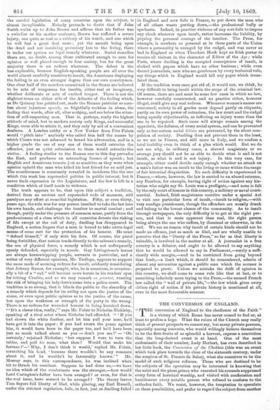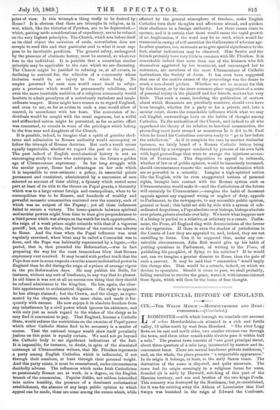THE CONVERSION OF ENGLAND.
THE conversion of England to the obedience of the Faith" is a victory of which Rome has never ceased to feel or, at least to profess a hope. What the rulers of the Church may really think of present prospects we cannot say, but many private persons, especially among converts, who would willingly believe themselves to be the first-fruits of so splendid a harvest, express a conviction that the long-desired event is at hand. One of the most enthusiastic of their number, Lady Herbert, has even described in her little book, the Conversion of the Chablais (this was an event which took place towards the close of the sixteenth century, under the auspices of St. Francis de Sales), what she conceives to be the model of such religious reforms. Those who are destined to be the subjects of the operation may be interested in knowing that the saint and the pious prince who executed his counsels suppressed every form of heretical worship, and visited with confiscation and banishment every notable person who refused to conform to the orthodox faith. We resist, however, the temptation to speculate on these possibilities, and prefer to regard the subject from another point of view. Is this triumph a thing really to be desired by Rome? It is obvious that there are triumphs in religion, as in war, which, like the victories of Pyrrhus, are to be deprecated,— which, putting aside considerations of expediency, are to be refused on the very highest principles. The Church, which sets before itself as its chief object the salvation of souls, nevertheless does not temple to send this and that particular soul to what it must sup- pose to be inevitable perdition. The general safety, endangered by the presence of obstinate heresy, must be secured, at whatever loss to the individual. It is possible that a somewhat similar principle may be applicable to the case which we are discussing. The Church might be justified in refusing or, at all events, in declining to contend for, the adhesion of a community whose inclusion would be an injury to the whole body. No empire governed by sanb men would exert itself to subju- gate a province which would be permanently rebellious, and even the more insatiable ambition of a religious community would hesitate to admit proselytes of a notoriously turbulent and insub- ordinate temper. Rome might have reason so to regard England, and even to act, so far as action in such a case would allow of control, in accordance with her fears. The conversion of in- dividuals would be sought with the usual eagerness, but a wilful and stiffnecked nation might be permitted, as far as active effort was concerned, to remain in want of the privileges which belong to the true sons and daughters of the Church.
It is possible, indeed, to imagine that a spirit of genuine obed- ience and submission to Roman authority would accompany or follow the triumph of Roman doctrine. But such a result seems equally improbable, whether we regard the past or the present. The past indeed of English eccclesiastical history is not an encouraging study to those who anticipate in the future a golden age of Ultramontane supremacy. In her long struggle with the secular power, Rome had advantages on her side which it is impossible to over-estimate : a policy, in esssential points permanent and consistent, administered by a succession of men aelected on account of their ability, a dynasty which rested some part at least of its title to the throne on Papal grants, a hierarchy which was to a large extent foreign and cosmopolitan, when to be cosmopolitan was to be Roman, and hundreds of wealthy and powerful monastic communities scattered over the country, each of which was an outpost of the Papacy ; yet all these influences failed to secure a victory. The home-quarrels between spiritual and secular powers might from time to time give preponderance to a third power which was always on the watch for such opportunities; the reign of a weak prince might coincide with that of a vigorous pontiff ; but, on the whole, the fortune of the contest was adverse to Rome. And the time when the Papal influence was most regularly exercised, when what may be called a Concordat was in tome, and the Pope was habitually represented by a legate,—the period, that is, that preceded the Reformation,—was in fact preparing the way for the most tremendous blow thab Roman aupremacy ever received. It may be said with perfect truth that the Tope does now in some respects exercise a moreundisturbed power in England than he did during the reign of a prince of average vigour in the pre-Reformation days. He may publish his Bulls, for instance, without any sort of hindrance, in any way that he pleases. In old times it was not at all an uncommon thing that they should he refused admittance to the kingdom. He has, again, the abso- lute appointment to ecclesiastical dignities. The right to appoint he has always claimed ; but the Crown, and the clergy, as repre- sented by the chapters, made the same claim, and made it fre- quently with success. He now enjoys it in absolute freedom from any interference by a civil power which ignores his existence, and with only just as much regard to the wishes of the clergy as he may find it convenient to pay. That England, become a Catholic State, would enforce the restrictions on the exercise of Papal power which other Catholic States find to be necessary is a matter of .course. That the national temper would show itself peculiarly jealous on this point is equally certain. We need not go beyond the Catholic body to see significant indications of the fact. It is impossible, for instance, to doubt, in spite of the simulated contempt of Ultramontane writers, that Mr. Ffoulkes represents a party among English Catholics which is influential, if not through their numbers, at least through their personal weight. And this party exists, it must be remembered, under circumstances -decidedly adverse. The influences which make Irish Catholicism so passionately Roman are at work, in a degree, on the English branch of the communion. Popular dislike, not seldom intensified into active hostility, the presence of a dominant ecclesiastical establishment, the absence of any large public opinion to which .appeal can be made, these are some among the causes which, while affected by the general atmosphere of freedom, make English Catholics turn their thoughts and affections abroad, and quicken their obedience to a foreign authority. Let these causes cease to operate, and it is certain that there would ensue the rapid growth of an Anglicanism, if the word may be so used, which would far transcend in energy of self-assertion the Gallicanism of a former age. In other quarters, too, so remote as to give special significance to the fact, similar indications may be observed. Miss Sauna and her friends probably have very little in common with Mr. Ffoulkes. It is remarkable indeed that more than one of the kinsmen who felt themselves aggrieved by her treatment, and encouraged her to resistance, are members of the most Ultramontane of Catholic institutions, the Society of Jesus. It has even been suggested that one of the motive causes of the proceedings was the desire to crush a non-Jesuit prelate. Whether we are to account for this by this theory, or by the more common-place suggestion of a sense of personal injury in the plaintiff and her friends, matters but very little. That such a cause, involving the publication of matters about which Romanists are peculiarly sensitive, should ever have been brought, whether for a party or for a private end, into a secular court, shows the remarkable influence which what we may call English surroundings have on the habits of thought among Catholics. To the authorities of the Church, and indeed to all who apprehend the theory of its relation to heretical communities, the proceeding must have seemed as monstrous 'as it did to St. Paul when he found his Corinthian converts ready to "go to law before the unbelievers." As if to complete the case by another dissimilar instance, we lately heard of a Roman Catholic bishop being threatened by a newspaper conducted by persons of his own faith with legal proceedings that were to avenge the injurious accusa- tion of Fenianism. This disposition to appeal to tribunals, whether of law or of public opinion, would be immensely increased, should circumstances remove the motives to subordination which are so powerful in a minority. Imagine a high-spirited nation like the English, with its even exaggerated notions of personal rights, brought into contact with the Roman system such as Ultramontanism would make it—and the Catholicism of the future will certainly be Ultramontane ;—imagine the habit of incessant appeals against any supposed wrong or neglect of duty, appeals to Parliament, to the newspapers, to any accessible public opinion, general or local ; this habit set side by side with a system of sub- ordinated despotisms, a Pope absolute over bishops, bishops absolute over priests, priests absolute over laity. We know what happens now if a bishop is partial to a relative, or arbitrary to a curate. Parlia- ment, the Press, all England ring with denunciations of the favour or the oppression. If there is even the shadow of jurisdiction in the Courts of Law they are appealed to, and, indeed, they are not unwilling to listen. Can it be supposed that, under any con- ceivable circumstances, John Bull would give up his habit of putting questions in Parliament, of writing to the Times, of publishing his pamphlet, of flying to his solicitor ? If he would not, can we imagine a greater disaster to Rome than the gain of such a convert. It may be said that " conversion " would imply this change also. That would be a miracle, indeed, on which we decline to speculate. Should it come to pass, we shall probably, failing ourselves to receive the grace, watch it with intense interest from Spain, which will then be the home of free thought.































 Previous page
Previous page